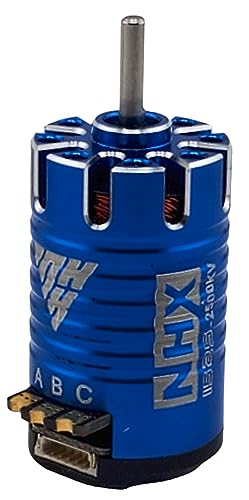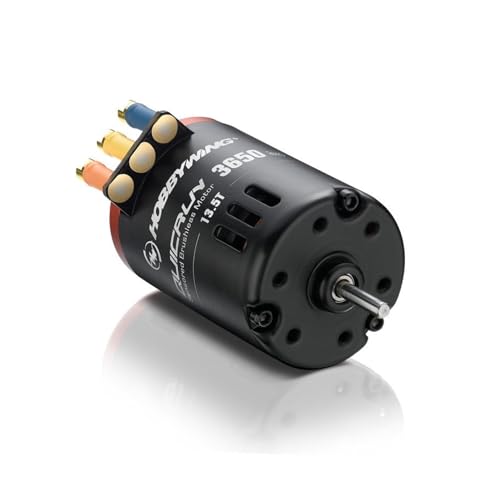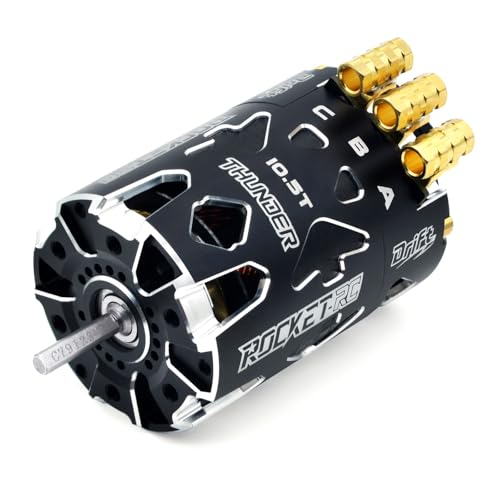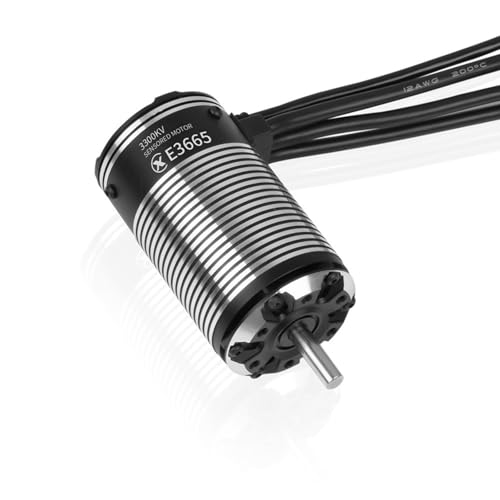As an Amazon Associate, we earn from qualifying purchases. Some links may be affiliate links at no extra cost to you. Although our opinions are based on curated research, we haven't used these products. Articles generated with AI.

The 5 Best Sensor-Powered RC Motors for Unmatched Performance in 2025
Looking for the best sensor-powered RC motors for 2025? Check out the NHX RC 2500KV Mini Brushless Motor for great speed and reliability. You’ll love the HOBBYWING 30404309 Quicrun 3650 G2, featuring impressive performance and precision. The Surpass Hobby Thunder Power 540 is perfect for drifting, while the XC E3665 Motor guarantees smooth operation. Finally, the Surpass Hobby 540 V5R offers excellent torque for 1:10 scale vehicles. Let’s plunge into the details and explore what makes these motors stand out!
Key Takeaways
- Look for motors with high KV ratings (2500KV or 3600KV) to enhance acceleration and top speed for your RC vehicles in 2025.
- Choose sensor-powered motors that match the vehicle’s scale; 1/24th or 1/28th requires around 2500KV, while 1/10th can handle higher ratings.
- Ensure compatibility with ESCs, confirming they support the motor’s KV ratings and maximum current draw for optimal performance.
- Prioritize motors made from premium materials like reinforced alloy aluminum for superior durability and heat dissipation during intense use.
- Consider power output needs; motors suitable for racing should deliver around 100 watts, while casual usage can require about 80 watts.
NHX RC 2500KV Mini Brushless Motor
If you’re looking for a powerful upgrade for your 1/24th or 1/28th scale RC vehicles, the NHX RC 2500KV Mini Brushless Motor is an outstanding choice. This 29.5T motor, weighing just 17g, boasts an impressive max power output of 80 watts and operates efficiently at 92%. You’ll appreciate its high-temperature, 2-pole rotor, as it withstands up to 200°C. With a max RPM of 60,000, you’ll experience rapid performance. The robust construction features quality NSK bearings and a durable aluminum casing. Plus, it offers both sensored and sensorless modes, making it highly compatible with various setups!
Best For: RC enthusiasts looking for a high-performance brushless motor for 1/24th and 1/28th scale vehicles.
Pros:
- High efficiency with 92% power output efficiency.
- Compact and lightweight design at only 17g, making it ideal for mini vehicles.
- Dual operation modes (sensored and sensorless) provide versatility in various setups.
Cons:
- Maximum voltage limit of 8.4V may restrict compatibility with certain setups requiring higher voltages.
- The 2500KV rating might not suit those seeking lower RPM options for different driving styles.
- Limited customer reviews with only two ratings may indicate uncertainty in a wider market feedback.
HOBBYWING 30404309 Quicrun 3650 G2 10.5T Sensored Brushless Motor
HOBBYWING 30404309 Quicrun 3650 G2 10.5T Sensored Brushless Motor
- Product name: quicrun-3650sd-10.5T G2; product number: 30404309
- KV Rating: 3600; LiPo Cells: 2-3S; Pole Count: 2; No-load Current(A): 2.8
- O.D.(mm): 36(1.147in); Length (mm): 52.8(2.079in); Shaft Diameter (mm): 3.17(0.125in); Weight (g): 186(6.561oz)
The HOBBYWING 30404309 Quicrun 3650 G2 10.5T Sensored Brushless Motor stands out as an excellent choice for hobbyists and competitive racers alike. With a KV rating of 3600, this motor provides impressive power for your 1/10th scale vehicles. It supports 2-3S LiPo cells, making it versatile for various applications, whether on-road or off-road. Weighing just 186 grams, its compact design (36 mm in diameter and 52.8 mm long) fits perfectly in most chassis. Plus, the fixed timing guarantees reliable performance. If you’re looking for a motor that combines quality with versatility, this model is definitely worth considering!
Best For: Hobbyists and competitive racers looking for a powerful and versatile motor for 1/10th scale vehicles.
Pros:
- High KV rating of 3600 provides impressive power and speed for racing and recreational use.
- Suitable for both on-road and off-road applications, making it versatile for various vehicle types.
- Compact and lightweight design (186 g) allows for easy integration into most chassis.
Cons:
- Fixed timing may limit tuning options for advanced racers seeking customized performance.
- Not suitable for models outside of 1/10th and 1/12th scale, restricting its application for other vehicle sizes.
- Requires 2-3S LiPo cells, which could mean additional costs if users don’t already own compatible batteries.
Surpass Hobby Thunder Power 540 Drift Sensored Brushless Motor for RC Cars
Surpass Hobby Thunder Power 540 Drift Sensored Blrushless Motor High-Torque & High-Efficiency RC...
- 【Thunder 540 Drift Brushless Motor】540 drift brushless motor for 1/10 scale competition RC drift car. Innovative aerodynamic structure design, high, medium and low...
- 【Unique Design】 The motor is pre welded with quick disconnect and plug-in connectors, which makes it quickand convenient to remove and replace the motor,removable and...
- 【More Smoothly and Durable】 Super high resistive internal resistance at full slot rate, high power output temperature rise reduced by 5% compared to previous...
For those diving into the thrilling world of RC drifting, the Surpass Hobby Thunder Power 540 Drift Sensored Brushless Motor stands out as a game-changer. This motor is perfect for 1/10 scale competition cars, featuring a 2-pole design for ultra-smooth operation. With a high-speed rotor that withstands temperatures up to 200°C, you’re set for action-packed runs. Its increased torque and efficiency provide better performance, while the innovative aerodynamic structure creates sound waves at high RPMs. Plus, with a lightweight 7075 aluminum alloy body, it offers superior heat dissipation and durability. Get ready to elevate your drifting experience!
Best For: RC drifting enthusiasts looking for a high-performance motor for their 1/10 scale competition cars.
Pros:
- High torque and efficiency enhance overall performance for competitive drifting.
- Lightweight 7075 aluminum alloy construction provides superior heat dissipation and durability.
- Removable structure allows for easy cleaning and maintenance.
Cons:
- May require specific wiring configurations due to the dual inductive interfaces and three Hall sensors.
- High temperature tolerance might be unnecessary for casual users or non-competitive settings.
- Premium materials and advanced design could lead to a higher price point compared to basic alternatives.
XC E3665 Sensored Brushless Motor for RC Car
XC E3665 Sensored Brushless Motor for RC Car,2-3S Lipo,IP67 Water Proof,Applicable to:1/10 Short...
- 【Developed for Enthusiasts】Cost-effective brushless power system designed for primary and intermediate level hobbyists Motor’s stable output and super explosive...
- 【Highly Efficient Thermal Performance】 Outstanding magnetic circuit combining with ultrathin 0.2mm thick silicon steel and high slot fill factor of high temperature...
- 【Excellent Production Process】Special rotor winding process with explosion-proof, high precision balance for increasing rotor’s service life and high-speed...
Ready to elevate your RC experience? The XC E3665 Sensored Brushless Motor is designed for serious performance. This powerful 3300KV motor operates efficiently on 2-3S LiPo batteries, delivering explosive acceleration and smooth climbs. Its robust IP67 waterproof and dust-proof housing guarantees durability, while high-quality materials like the alloy aluminum shell and stainless steel shaft enhance reliability. You’ll love the precision performance, thanks to optimized thermal management and advanced torque control. Pair it with the recommended XC ESC for seamless functionality and enjoy real-time monitoring. Users rave about its quick acceleration and installation ease, making it a top choice for your RC projects!
Best For: Enthusiast RC car hobbyists seeking a high-performance, reliable motor for competitive racing and versatile RC projects.
Pros:
- High efficiency with 3300KV output, providing explosive acceleration and smooth climbing capabilities.
- Durable design featuring IP67 waterproofing and high-quality materials for long-lasting use.
- Positive user feedback on installation ease and seamless operation when paired with the recommended XC ESC.
Cons:
- Best performance may only be achieved with specific ESC compatibility, which can limit options.
- Limited to 2-3S LiPo batteries, potentially restricting power for certain advanced setups.
- Some users may find the initial cost competitive but still higher than entry-level motors.
Surpass Hobby 540 V5R 21.5T Sensored Brushless Motor for 1:10 RC Car/Truck
Surpass Hobby 540 V5R 21.5T Sensored Brushless Motor, Competition Level 2500kv RC Motor with Shaft...
- 【540 V5R Brushless Motor】540 21.5T 2500kv sensored brushless motor for 1/10 scale racing car,compatible with any sensored / sensorless ESC.
- 【High RPM 】The new and unique stator design of V5R silver-black stock motor is optimised to provide strong torque and high RPM.
- 【High Grade Material】 CNC Machined Billet T6 Aluminum Heatsink Can,New stator coating for better heat dissipation and long termsurface corrosion resistance. High...
Release the full potential of your 1:10 scale RC car or truck with the Surpass Hobby 540 V5R 21.5T Sensored Brushless Motor. This powerful motor features a robust 2500kv design, delivering impressive torque and speed. Its high-purity copper windings guarantee maximum conductivity, while the CNC machined aluminum heatsink can helps with heat dissipation. You’ll appreciate the adjustable timing and dual sensor ports, allowing customization for peak performance. With compatibility for both sensored and sensorless ESCs, it easily fits into your setup. Plus, it performs well in drifting and touring applications, keeping cool even under pressure. Experience unmatched performance today!
Best For: Enthusiasts looking to enhance the performance of their 1:10 scale RC cars and trucks with a reliable and potent brushless motor.
Pros:
- High torque and RPM performance, optimized for speed and agility in RC applications.
- Durable construction with CNC machined aluminum for efficient heat dissipation and longevity.
- Versatile compatibility with both sensored and sensorless ESCs, providing flexibility in setup.
Cons:
- Maximum output is limited to 100W, which may not be sufficient for high-end racing setups.
- Requires familiarity with motor tuning for optimal performance adjustments.
- The recommended battery range (1-3s LiPo) may limit power options for some users.
Factors to Consider When Choosing a Sensored Rc Motor

When picking a sensored RC motor, you’ve got to take into account several key factors. Motor specifications, power, and efficiency play major roles in performance, while durability guarantees your motor withstands tough environments. Plus, making certain it’s compatible with your ESC and right for your application is essential for a smooth ride!
Motor Specifications Importance
Choosing the right sensored RC motor isn’t just about picking something that looks good; it’s essential to understand the specifications that dictate performance. Start with the KV rating; for example, a motor rated at 2500KV can reach up to 60,000 RPM. Next, consider battery compatibility; using 2-3S LiPo cells guarantees ideal voltage for your motor. Don’t overlook the maximum amperage rating, like 8A or 28A, which directly impacts power delivery and efficiency. The weight of the motor matters too; lighter options, like a 17g motor, suit smaller vehicles, while heavier models need stronger support. Finally, pay attention to construction materials, as high-temperature components enhance durability and heat dissipation, keeping your motor performing at its best.
Power and Efficiency
Power and efficiency are two vital factors that can make or break your experience with a sensored RC motor. When you’re choosing, look for motors with power output efficiency ratings up to 94%. This means they convert more electrical energy into motion. A high KV rating, like 2500KV or 3600KV, boosts your acceleration and top speed, essential for top performance. Consider motors with low internal resistance, such as 0.652mΩ, for smoother operations and less heat. A maximum power rating of 100 watts enhances torque and responsiveness. Plus, opting for motors that can run on various voltage levels, like 2-3S LiPo batteries, allows for versatile setups while ensuring efficient power use tailored to your needs.
Durability and Construction
A motor’s durability can dramatically affect your RC experience, especially during intense races or challenging terrains. Choosing sensored motors made with high-quality materials, like reinforced alloy aluminum shells and stainless steel shafts, will help resist wear and tear. Look for CNC machined construction as it enhances heat dissipation and corrosion resistance, leading to a longer lifespan. High-temperature resistant enameled wire in the windings allows your motor to endure tough conditions without losing performance. Oversized bearings increase load capacity and minimize wear, paving the way for smoother operation. Finally, consider motors with removable structures for easy cleaning and maintenance, which keeps everything running efficiently. These factors will dramatically boost your motor’s durability for thrilling races ahead!
Compatibility With ESC
When diving into the world of sensored RC motors, compatibility with Electronic Speed Controllers (ESC) is essential for a seamless racing experience. First, verify your motor works with both sensored and sensorless ESCs, like the Surpass Hobby 540 V5R. Check the motor’s KV rating and turn count to match the ESC; for instance, a motor with a 3600KV rating requires specific ESC settings for performance. Also, confirm the number of supported LiPo cells, which impacts your ESC choice. Pay attention to the motor’s current draw, max amps, and efficiency ratings, as they need to align with the ESC limits. Finally, explore the motor’s timing features, like those on the HOBBYWING Quicrun 3650 G2, to guarantee peak performance.
Application and Scale Considerations
Choosing the right sensored RC motor kicks off with considering your vehicle’s scale and application. For instance, if you’ve got a 1/24th or 1/28th scale RC vehicle, go for smaller motors with a KV rating of around 2500. However, a 1/10th scale vehicle can handle higher KV ratings like 3600 or 21.5T.
Confirm the motor’s compatible with your electronic speed controller (ESC). Some motors operate in both sensored and sensorless modes, impacting performance. You’ll also want the motor’s power output to match your needs; 100 watts is great for racing, while 80 watts works for casual fun. Finally, consider the motor’s size and weight to guarantee it fits your vehicle perfectly.
Frequently Asked Questions
How Do I Maintain My Sensor-Powered RC Motor for Longevity?
To maintain your sensor-powered RC motor for longevity, start by regularly cleaning it with a soft brush to remove dust and debris. Check the bearings for wear and apply lubricant as needed. Inspect electrical connections for corrosion and tighten screws. Monitor the temperature during use; excessive heat can damage components. Store it in a cool, dry place when not in use, and avoid overloading it to guarantee peak performance for years to come.
What Is the Price Range for Quality Sensored RC Motors?
Quality sensored RC motors usually range from $50 to $200. For budget-friendly options, expect prices closer to $50. However, if you want high-end motors offering precise control and durability, you might spend up to $200. Look for features like KV rating, torque specifications, and compatibility with your setup. Investing in a good motor makes a significant difference in your RC experience, providing you with better performance and reliability on every run.
Can I Use Sensored Motors in Non-Sensored Setups?
You can use sensored motors in non-sensored setups, but keep a few key points in mind. Sensored motors offer precise control, so they might run differently due to the lack of feedback in non-sensored systems. You’ll also need to make certain your ESC (Electronic Speed Controller) can handle this setup. While performance may vary, enjoy experimenting and tuning your RC vehicle for better handling and responsiveness during your next race!
How Does Sensor Technology Improve Motor Performance?
Sensor technology boosts motor performance by providing real-time feedback on position and speed. With sensors, your motor can adjust its torque and speed seamlessly, improving efficiency and responsiveness. This means quicker acceleration and sharper control during races or maneuvers. You’ll notice less cogging, a smoother operation, and better overall consistency, making your RC experience more exhilarating. Plus, you can fine-tune setups for specific conditions, elevating your performance to new heights!
What Common Issues Might Arise With Sensored RC Motors?
Common issues with sensored RC motors can feel like a tangled ball of yarn. First, you might encounter sensor misalignment, causing erratic performance. Temperature sensitivity can also lead to sluggishness, especially in extreme conditions. Additionally, dirt can obstruct sensors, affecting responsiveness. Battery life might suffer due to added complexity, draining power faster. Regular maintenance, like cleaning and checking connections, helps keep your motor running smoothly and guarantees peak performance during your next race.









